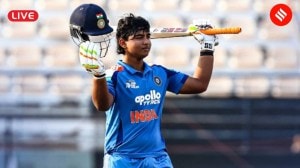After the honeymoon
As much as the Hizbul Mujahideen's decision to renege on its offer of a three-month ceasefire is regrettable, only the naive would have fa...

As much as the Hizbul Mujahideen8217;s decision to renege on its offer of a three-month ceasefire is regrettable, only the naive would have failed to see it coming. Even so, one cannot quite assert that with Hizb chief Syed Salahuddin8217;s hostile words in Islamabad on Tuesday, it8217;s back to square one in the Valley. Indeed, it has been a long fortnight since the terrorist organisation8217;s chief commander, Abdul Majid Dar, dramatically announced cessation of hostilities on July 24. If Dar8217;s action highlighted differences between the Kashmir and Pakistan-based wings of the Hizbul Mujahideen, the subsequent round of talks with government emissaries brought out sharp divisions within the Hurriyat. New Delhi, for its part, adopted its most conciliatory posture since 1989 by declaring its willingness to talk to a wide cross-section of the secessionist establishment. And Islamabad once again evidenced its proactive role in the proxy war, first with the synchronised massacres on August 1 and then by forcing the Hizb8217;s hand inwithdrawing the ceasefire.
So how is the latest development to be assessed? Is it a setback in the nascent peace process or is it merely a reality check? Is it an act of desperation by Islamabad to derail this process or is it a demonstration of strength to put New Delhi on the back foot? As always, the truth probably lies somewhere in between. Having committed itself so emphatically to pursuing peace talks in Kashmir, the government will be under pressure in coming days to consolidate the tenuous consensus for dialogue. It can only be hoped that political parties will persist with their commitment to this endeavour. But given the manner in which the hesitant first round of negotiations with the masked Hizbul Mujahideen commanders enraged other secessionist formations, securing a representative delegation of Kashmiri leaders will not be easy. It will take deft deployment of the carrot and the stick to convey to the motley group of Kashmiri leaders the fact that peace is not a zero-sum game. Significantly, counter-insurgency operativesalready speak of weaning away Hizb cadres in the Valley who are desirous of persisting with the ceasefire. These anonymous claims must be substantiated with evidence. A split in the Hizbul Mujahideen is the least that must be salvaged from the short-lived ceasefire.
But what of Pakistan? It is widely agreed that its leadership is under pressure from both Washington and Beijing to calibrate its Kashmir policy. The withdrawal of the ceasefire, however, puts in doubt the lonely superpower8217;s reputed hold over Pakistani decision-makers. Post-withdrawal, the US state department spokesperson has said that the US 8220;recognises that for the Kashmir dispute to be solved, there has to be renunciation of violence and respect for the Line of Control8221;. Given recent experience, such soft words will find little resonance in Islamabad. But for the Indian government, the task is obvious: to maintain its readiness to talk to all sections of the Kashmiri population, to articulate more coherently its proposals for peace in the Valley, to anticipate terrorist acts of provocation.
- 01
- 02
- 03
- 04
- 05































